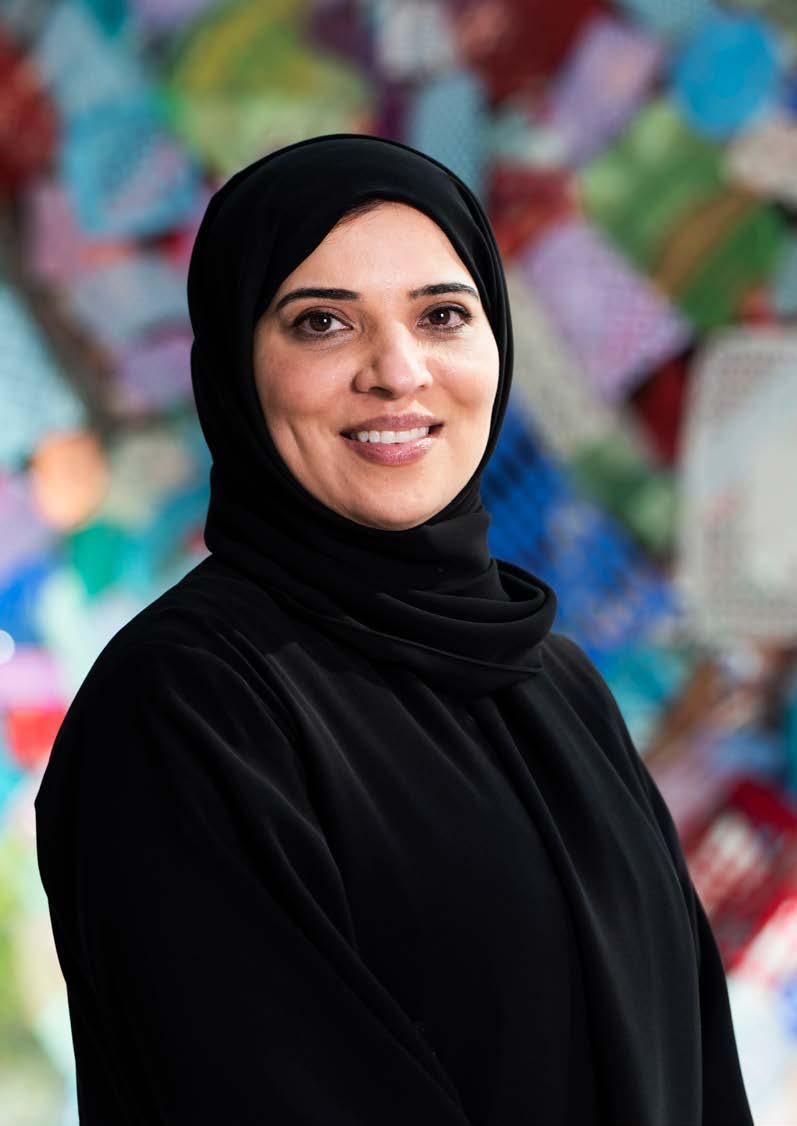
8 minute read
DR. HABIBA ALSAFAR- CRACKING THE EMIRATI GENETIC CODE FOR PRECISION HEALTHCARE
From establishing the UAE’s first patient registry, to constructing the Emirati reference genome, Dr. Habiba Alsafar has long been a champion of research in the field of genetics for improved healthcare and precision medicine.
A name that always crops up in the field of genetics in the UAE, is that of Dr. Habiba Alsafar. She is the Founding Director of the Center for Biotechnology, Associate Dean of Student Affairs at the College of Medicine and Health Sciences, and an Associate Professor of Genetics and Molecular Biology at Khalifa University (KU), as well as being a member of the Emirates Scientists Council.
Advertisement
During her third year of pre-medical studies at San Diego State University, Dr. Alsafar’s path diverged from her original goal to work in medicine when she took a genetics class and became enthralled by the subject. Genetics appeared to explain so much about how characteristics are expressed, and yet there remained a great deal to be discovered and many questions to be answered.
After receiving her Bachelor’s degree in biochemistry in 2002, Dr. Alsafar enrolled at the University of Liverpool to pursue her Master’s in medical engineering and focused her efforts on tissue and genetic engineering. Upon graduating in 2003, she took her new degree back to the UAE, where she joined Dubai Police as a forensics expert.
It was during this time, occupied with the analysis of crime scene evidence, that Dr. Alsafar acknowledged that she wanted to learn more. She decided to pursue her doctorate, for which Dubai Police sponsored her studies at the University of Western Australia. After initially focusing on genetic technologies for forensic applications, Dr. Alsafar realized that the same tools used for investigative work could easily be applied to medicine, simultaneously satisfying her work requirements as a forensic scientist while delving into her passion of researching why certain genes cause disease. She began working on a project to identify specific genes that predispose carriers to cardiometabolic diseases, specifically type 2 diabetes (T2D), which would become a major focus of her career.
At the time, T2D was becoming recognized as a serious concern in the UAE, with prevalence rates reaching around 20%, particularly among Emirati and South Asian populations. This high prevalence posed a significant national health challenge, as T2D is part of a combination of metabolic dysfunctions that causes a cardiometabolic disease characterized by insulin resistance, impaired glucose tolerance, dyslipidemia, hypertension, and central adiposity – leading to poor health and early death rates.
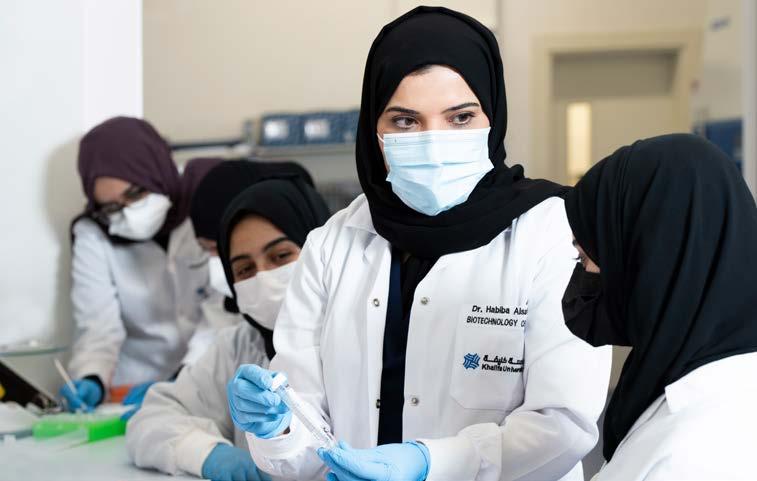
She began the project working with a family of which many members were afflicted by T2D. Biospecimens provided by the family members enabled Dr. Alsafar to study their genetic makeup, to ascertain possible causes of the illness. The next step was to compare the resulting genetic analysis with other diabetic patients, but at the time the UAE had no patient registries. Dr. Alsafar, therefore, set about creating one. The result was the establishment of the Emirates Family Registry in 2007, which now contains data from more than 26,000 volunteers and was described in a peerreviewed paper in the International Journal of Diabetes in Developing Countries.
Dr. Alsafar went on to use the registry to undertake and complete the UAE’s first genome-wide association study, which aimed to identify the genetic basis for T2D susceptibility in the local Bedouin population. This work featured in a peer-reviewed paper in the Annals of Human Genetics.
“This registry helped me to link T2D in the Emirati population to genes and also showed the importance of establishing patient registries in the UAE to study potential disease mechanisms,” Dr. Alsafar shared.
This work resulted in two of her most cherished prizes – The UAE Pioneers Award from His Highness Sheikh Mohammed bin Rashid Al Maktoum, Vice President and Prime Minister of the UAE, Ruler of Dubai, and the 2015 L'Oréal-UNESCO For Women in Science Middle East Fellowship Award.
Having completed her PhD in 2010, Dr. Alsafar returned to the UAE to resume her position with Dubai Police. Within a year, however, she found that her interests had shifted more towards research than applied forensics.
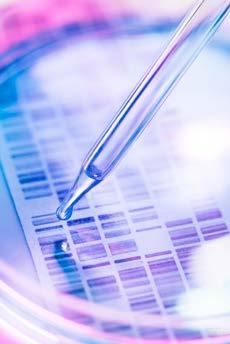
“In 2011, I felt it was time for me to join academia. I found the newly established Khalifa University and liked their mission and their focus on research. I applied and joined as an assistant professor, with an idea that I would create a biotechnology center, gathering genetic and phenotypic data and building competencies in sequencing technology to study the genomes of humans and other species,” she recalled. Four years later, the KU Center of Biotechnology was established under Dr. Alsafar’s directorship. Since its establishment, the center has produced many genetics and genome science projects, resulting in a steady stream of publications.
In 2015, Dr. Alsafar embarked upon a project that she considers to be among her most satisfying achievements – the UAE Genome Project – which sought to complete whole genome sequencing for a large sample of the national population, to provide an Emirati reference genome.
Currently, genetic analysis in medical research uses a reference genome as its baseline. The most used baseline, GRCh38, derives 70% of its material from one donor, and the remainder from 10 others – mostly of Caucasian origin. Given the genetic variation across human ancestries, using such a limited reference genome as a standard for genetic analysis can lead to erroneous findings. With the UAE’s genetically diverse Emirati population and the prevalence or unique distribution of disease types, Dr. Alsafar felt it was particularly important that the Emirati population have its own reference genome.
“Less than 1% of Arab genome knowledge was in the public domain. By completing the whole genome sequence of Emirati subjects, we could characterize the genetic code, enabling us to better understand the causes of diseases, what they are influenced by, how to explain susceptibility, and what actionable plan individuals need to make to prevent or treat illness. With greater knowledge of our genetic makeup, we could approach disease management in a different way through precision medicine that matches the personal or unique characteristics of an individual,” Dr. Alsafar said.
- Dr. Habiba Alsafar, Director, Center for Biotechnology Associate Dean of Student Affairs, College of Medicine and Health Sciences Associate Professor of Genetics and Molecular Biology at Khalifa University
The project team started with the collection of bio-samples from 1,028 Emirati volunteers. After genotyping and screening, 129 samples were selected as being most representative of the entire cohort. Of these, 125 samples were analyzed for genome reference construction and the remaining four were set aside as test samples. In total, 120 samples were used for whole genome sequencing and 33 for whole exome sequencing. Whole genome sequencing analyzes the entire DNA content of an individual, while whole exome sequencing focuses only on the protein-coding regions of genes in a genome. The result of the analysis was an Emirati reference genome that comprehensively described the genetic makeup of the local population, defining genotypes and allele frequencies.
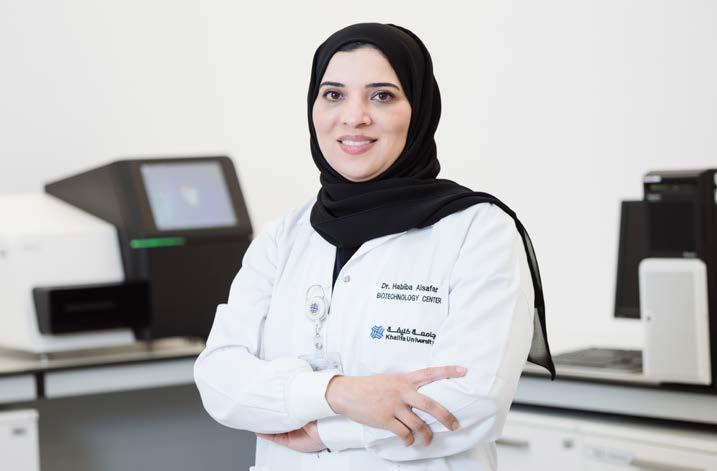
In just six years – four fewer than Dr. Alsafar had originally targeted – the project was complete. The result of the analysis was an Emirati reference genome that comprehensively described the genetic makeup of the local population, defining genotypes and allele frequencies. Last April, a paper detailing the findings of the project was published in the journal Frontiers in Genetics.
Explaining the impact of the project, Dr. Alsafar said: “Our work demonstrates that there is a 20% difference between the Emirati genome and the typical reference genome. Some of these differences may lie in important genes, which means that a particular treatment may not necessarily fit everyone. We have only just published our report. I hope policymakers and others will read and apply its findings to provide more personalized medical care.”
Having only recently achieved her longterm goal of constructing the Emirati reference genome, Dr. Alsafar said she has yet to identify her next big project, but she does know one thing she will be focusing on – continuing to mentor and train the next generation of young scientists.
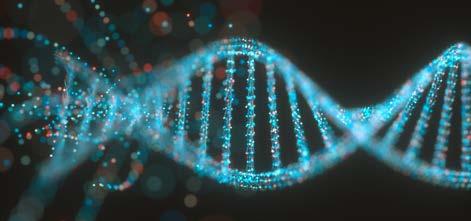
“When I initially set off on my path, I was motivated by the need to gain knowledge. Now that I have the knowledge – albeit only part of the puzzle – I am driven by a need to transfer these experiences to my students to build our national research capacity in biomedical and health sciences. That is why I am spending so much more of my time mentoring students, setting up laboratories and programs for them, and getting them trained to the highest standards,” she shared.
It is Dr. Alsafar’s hope that her pioneering work in genetics and student mentorship in the UAE will lead to increased capacity, understanding, and management of illness – whether that be T2D, obesity, cardiovascular disease, or through her more recent work analyzing SARS-CoV-2 and identifying risk factors that affect the severity of COVID-19.
“Through my passion for science, genetics, and mentorship, I would like to think that my work contributes to my beloved country and to my fellow citizens. The major impact I would like my work to have is to see people living long, healthy lives. We shouldn’t be losing our family members at a young age from diseases that are easily prevented or managed. That is what I hope my work will contribute towards in the UAE,” she concluded.






